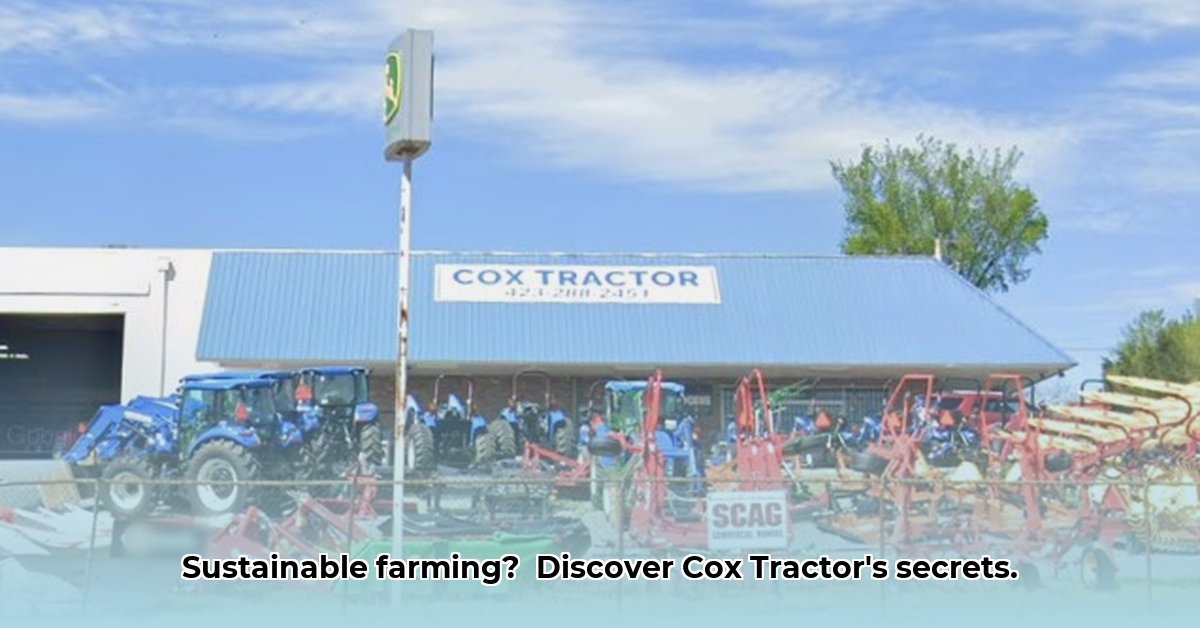
Revolutionizing Sustainable Farming in Kingsport
Cox Tractor in Kingsport, Tennessee, is playing a vital role in shaping the future of sustainable agriculture. While not directly involved in farming, their provision and servicing of agricultural equipment significantly impacts the environmental footprint and economic viability of local farms. By ensuring farmers have access to efficient and reliable machinery, Cox Tractor indirectly promotes sustainable practices. This article explores Cox Tractor's current contributions and outlines actionable steps to further enhance their impact on sustainable farming in the region. For used equipment options, check out this resource.
How is efficient farming equipment crucial for environmental sustainability? A well-maintained tractor, for instance, consumes less fuel and achieves higher productivity, leading to reduced emissions and increased food output per resource unit. This efficiency isn't merely cost-effective; it's fundamental to environmentally responsible farming. Reliable equipment minimizes downtime, reducing the pressure on farmers to compromise environmental stewardship due to time constraints. The ready availability of parts further contributes to seamless operation, preventing delays and ensuring the continuous application of sustainable farming methods.
Opportunities for Growth and Enhancement at Cox Tractor
While Cox Tractor's current operations contribute positively to sustainable agriculture, significant opportunities exist for improvement and expansion to further enhance their environmental footprint and market leadership. Their primary focus on sales and repairs presents a strategic opportunity to directly incorporate sustainable practices into their business model.
One significant area for development lies in offering more environmentally friendly equipment. The introduction of electric tractors or models powered by biofuels could dramatically decrease emissions and align Cox Tractor with the growing demand for sustainable agricultural practices among farmers. Exploring and promoting these alternative energy sources would enhance their appeal and market position. It's worth examining what steps Cox Tractor is actively taking to assess and reduce their own environmental impact beyond servicing equipment.
A second area for consideration involves the environmental implications of their business practices. While current business practices, such as a 20% restocking fee, may seem standard, their environmental impact demands scrutiny. Investigating more environmentally friendly waste management strategies, for instance, by partnering with recycling centers, could minimize waste. Re-evaluating return and exchange policies to discourage unnecessary returns and subsequent disposal of perfectly functional equipment could significantly reduce wastefulness.
A Roadmap to a Greener Future: Actionable Steps for All Stakeholders
Achieving the goal of sustainable agriculture requires a collaborative effort among Cox Tractor, farmers, and equipment manufacturers. The following roadmap outlines short-term and long-term goals designed to enhance Cox Tractor’s contribution.
Short-Term Goals (within the next year):
Cox Tractor: Conduct a comprehensive environmental impact assessment and begin actively sourcing and stocking more sustainable equipment, focusing on lower-emission and renewable energy options.
Farmers: Optimize the use of newly acquired equipment to maximize resource efficiency (water, fuel), prioritizing fuel-efficient models available from Cox Tractor.
Equipment Manufacturers: Enhance collaboration with farmers and Cox Tractor to develop and offer even more environmentally friendly equipment, actively supporting sustainable farming initiatives.
Long-Term Goals (over the next 3-5 years):
Cox Tractor: Develop a comprehensive sustainability plan addressing responsible parts sourcing, waste reduction, and carbon footprint minimization. Proactively promote their sustainable equipment offerings to customers.
Farmers: Invest in new, environmentally friendly equipment, leveraging financing options and participating in workshops hosted by Cox Tractor to learn about and adopt advanced sustainable agricultural practices.
Equipment Manufacturers: Collaborate on Research and Development (R&D) for sustainable farm technologies and increase the availability of such technologies in the market.
Local Communities: Actively support local environmental conservation and responsible land management initiatives, recognizing the shared benefits of a sustainable agricultural ecosystem.
Conclusion: Embracing a Sustainable Future
Cox Tractor’s contribution to sustainable agriculture, through the supply of efficient equipment, is already significant. The implementation of specific sustainability measures and practices will dramatically increase their overall positive impact on the environment and the local farming community. This commitment represents not only environmental stewardship but also a strategic advantage in a growing market. By embracing the collaborative roadmap outlined above, Cox Tractor can become a leader in fostering a thriving and sustainable agricultural future for Kingsport and beyond. The path forward is clear: collaboration, innovation, and a shared commitment to a greener future.